|
|
|
Sort Order |
|
|
|
Items / Page
|
|
|
|
|
|
|
| Srl | Item |
| 1 |
ID:
152414
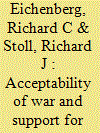

|
|
|
|
|
| Summary/Abstract |
We study the factors that influence citizen support for defense spending in fourteen democracies over the period 2004–2013. We pose two research questions. First, what factors influence citizen support for war and military force? We refer to this as the acceptability of war. Second, in addition to the acceptability of war, what other factors affect support for defense spending? Our principal finding is that citizen acceptance of war and support for defense spending are most influenced by basic beliefs and values. Gender also has a strong negative influence on attitudes toward war and thus indirectly lowers support for defense spending among women. Attitudes toward war and defense spending are also sometimes influenced by short-term threats and by alliance considerations, but the effects are not as substantively meaningful. We conclude with a summary of the results and a discussion of the implications for theory and policy.
|
|
|
|
|
|
|
|
|
|
|
|
|
|
|
|
| 2 |
ID:
130269
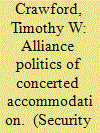

|
|
|
|
|
| Publication |
2014.
|
| Summary/Abstract |
This article examines the challenges allies face in coordinating diplomatic efforts to accommodate and peel off their main enemy's Potential Allies. It elucidates the key dimensions, and the underlying Coordination Dynamics, of this problem of "concerted accommodation," and it develops propositions about the conditions that shape the efficacy of such efforts. The argument links allies' strength to their divergent or convergent assessments of the target state's ability to tip the war toward victory or defeat. Divergent assessments foster weak allied efforts that are likely to fail, but when allies agree that the target is a potential "war-tipper," they will support their concerted accommodation policy with more robust cooperation that is more likely to work. The causal arguments and mechanisms are examined in a paired comparison analysis of two First World War cases: the Entente's efforts to induce (1) Ottoman neutrality and (2) Italian intervention.
|
|
|
|
|
|
|
|
|
|
|
|
|
|
|
|
| 3 |
ID:
002845
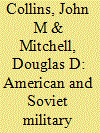

|
|
|
|
|
| Publication |
Washington, D C, Georgetown University, 1978.
|
| Description |
xxvii, 496p.
|
| Standard Number |
0892060026
|
|
|
|
|
|
|
|
|
|
|
|
Copies: C:1/I:0,R:0,Q:0
Circulation
| Accession# | Call# | Current Location | Status | Policy | Location |
| 034258 | 355.00973/COL 034258 | Main | On Shelf | General | |
|
|
|
|
| 4 |
ID:
132808
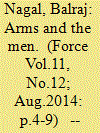

|
|
|
|
|
| Publication |
2014.
|
| Summary/Abstract |
The five pre-1998 nuclear powers have matured their Nuclear Command and Control Structures, and Nuclear Forces Structures (NFS) over a period ranging from 70 years for the US to 50 years for China.
The Cold War arms race created thousands of systems for command and control or functioning of military forces. The C4ISR systems deployed or under development provide 24 hours continuous surveillance of each other's areas/offensive weapons, detect movement of strategic systems or change of deployment patterns and allied/linked systems. The command and control of these powers are well developed, with state-of-the-art electronic systems to function under NBC conditions. The command centres are located in deep underground hardened shelters, capable of withstanding nuclear attacks, functioning 24x7.
|
|
|
|
|
|
|
|
|
|
|
|
|
|
|
|
| 5 |
ID:
147315
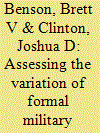

|
|
|
|
|
| Summary/Abstract |
Many critical questions involving the causes and consequences of formal military alliances are related to differences between various alliances in terms of the scope of the formal obligations, the depth of the commitment between signatories, and the potential military capacity of the alliance. Studying the causes and consequences of such variation is difficult because while we possess many indicators of various features of an alliance agreement that are thought to be related to the broader theoretical concepts of interest, it is unclear how to use the multitude of observable measures to characterize these broader underlying concepts. We show how a Bayesian measurement model can be used to provide parsimonious estimates of the scope, depth, and potential military capacity of formal military alliances signed between 1816 and 2000. We use the resulting estimates to explore some core intuitions that were previously difficult to verify regarding the formation of the formal alliance agreement, and we check the validity of the measures against known cases in alliances as well as by exploring common expectations regarding historical alliances.
|
|
|
|
|
|
|
|
|
|
|
|
|
|
|
|
| 6 |
ID:
128999
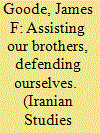

|
|
|
|
|
| Publication |
2014.
|
| Summary/Abstract |
The Iranian military intervention in Oman (1972-75) proved to be one of Shah Mohammad Reza Pahlavi's most successful foreign policy initiatives. He entered at the request of Sultan Qabus to help quell the Marxist rebellion of the Popular Front for the Liberation of Oman in Dhufar province. The shah took this action without any prior consultation with either Britain or the United States, acting for reasons wholly related to Iran's regional security. In so doing, he angered most of his Arab neighbors, who protested vigorously. He persisted. His troops tipped the balance in favor of the sultan's forces, contributing to a speedy end to the insurrection, for which Iran earned the lasting gratitude of the sultan.
|
|
|
|
|
|
|
|
|
|
|
|
|
|
|
|
| 7 |
ID:
134134
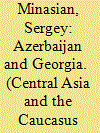

|
|
|
|
|
| Publication |
2014.
|
| Summary/Abstract |
The relations between Georgia and Azerbaijan are a key factor in regional politics and security in the Southern Caucasus. They strongly affect economic contacts and trade, as well as the implementation of all sorts of communication and energy projects. The two countries agree on many issues of regional policy, the way ethnopolitical conflicts should be settled, and the degree to which external actors could or should be involved. Turkey's presence in bilateral Georgian-Azeri relations is another important factor that may end in a geopolitical triangle of sorts in the Southern Caucasus. On the other hand, these relations cannot and should not be described as a formalized full-scale political, let alone, military-political alliance with corresponding mutual obligations. The author discusses these and other aspects of bilateral relations, assesses the prospects for further cooperation, and points to the possible challenges and problems that might crop up later.
|
|
|
|
|
|
|
|
|
|
|
|
|
|
|
|
| 8 |
ID:
039683
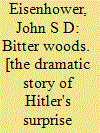

|
|
|
|
|
| Publication |
London, Robert Hale and company, 1969.
|
| Description |
481p.Hbk
|
| Standard Number |
709111460
|
|
|
|
|
|
|
|
|
|
|
|
Copies: C:1/I:0,R:0,Q:0
Circulation
| Accession# | Call# | Current Location | Status | Policy | Location |
| 004373 | 940/EIS 004373 | Main | On Shelf | General | |
|
|
|
|
| 9 |
ID:
038500
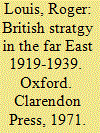

|
|
|
|
|
| Publication |
Oxford, Clarendon Press, 1971.
|
| Description |
284p.Hbk
|
| Standard Number |
0198223463
|
|
|
|
|
|
|
|
|
|
|
|
Copies: C:1/I:0,R:0,Q:0
Circulation
| Accession# | Call# | Current Location | Status | Policy | Location |
| 008302 | 940.412/LOU 008302 | Main | On Shelf | General | |
|
|
|
|
| 10 |
ID:
152501
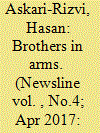

|
|
|
| 11 |
ID:
051476
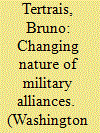

|
|
|
| 12 |
ID:
131132
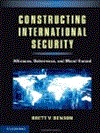

|
|
|
|
|
| Publication |
Cambridge, Cambridge University Press, 2012.
|
| Description |
xiii, 207p.Hbk
|
| Contents |
B
|
| Standard Number |
9781107027244
|
|
|
|
|
|
|
|
|
|
|
|
Copies: C:1/I:0,R:0,Q:0
Circulation
| Accession# | Call# | Current Location | Status | Policy | Location |
| 057780 | 355.031/BEN 057780 | Main | On Shelf | General | |
|
|
|
|
| 13 |
ID:
150482
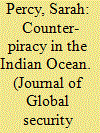

|
|
|
|
|
| Summary/Abstract |
This article examines how a group of loosely connected, often adversarial states have managed to conduct successful counter-piracy operations off the coast of Somalia. The traditional literature on multinational military cooperation assumes that such cooperation will be successful when it is hierarchically organized with a strong central command and unity of action. Counter-piracy has functioned well because it takes a fundamentally different, networked form. Counter-piracy operations are egalitarian, rather than hierarchical, and operate using informal links between militaries. This article considers the implications of informal military cooperation, and the extent to which lessons from counter-piracy can be applied elsewhere.
|
|
|
|
|
|
|
|
|
|
|
|
|
|
|
|
| 14 |
ID:
001205


|
|
|
|
|
| Publication |
Westport, Praeger, 1997.
|
| Description |
xii, 279p.
|
| Standard Number |
0275958577
|
|
|
|
|
|
|
|
|
|
|
|
Copies: C:1/I:0,R:0,Q:0
Circulation
| Accession# | Call# | Current Location | Status | Policy | Location |
| 040700 | 355.031/GAR 040700 | Main | On Shelf | General | |
|
|
|
|
| 15 |
ID:
072705
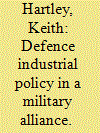

|
|
|
|
|
| Publication |
2006.
|
| Summary/Abstract |
Much of the alliance literature has focused on the collective defence benefits and burden-sharing. This article considers the potential for developing a defence industrial policy in a military alliance. Previous proposals from the literature are reviewed, especially proposals for economic specialization based on comparative advantage applied to both armed forces and defence industries in a military alliance. European Union (EU) defence policy is outlined, including its armaments agencies (OCCAR and the European Defence Agency), and inefficiencies in EU defence markets are identified. Economic theory offers some policy guidelines for an efficient defence industrial policy in a military alliance, including gains from trade and competition, from learning and scale economies, and from reducing the duplication of costly R&D. These economic principles are applied to the EU and are also applicable to NATO. Evidence of efficiency gains from trade and from economies of scale and learning is reviewed and applied to various scenarios for the creation of a Single European Market for defence equipment. The scenarios include a liberalized competitive market, a centralized EU procurement agency and a 'twin-track' model. Estimates are presented of the cost savings from these scenarios. However, proposals for an efficient defence industrial policy will be opposed by the potential losers who will prefer alternative industrial policies involving international collaboration and offsets. Among these alternatives, collaboration is assessed as a distinctive European policy. The inefficiencies of collaboration are reviewed, including its impact on development and production costs and on delays in delivery. Consideration is given to the research issues to be addressed by an economic evaluation of European collaborative projects. The article concludes by stressing the inefficiencies of current procurement policies in the EU and NATO and the potential cost savings from the adoption of a more efficient defence industrial policy within an alliance.
|
|
|
|
|
|
|
|
|
|
|
|
|
|
|
|
| 16 |
ID:
036733
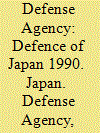

|
|
|
|
|
| Publication |
Japan, Defense Agency, 1990.
|
| Description |
xvi, 346p.
|
| Standard Number |
4789005550
|
|
|
|
|
|
|
|
|
|
|
|
Copies: C:1/I:0,R:0,Q:0
Circulation
| Accession# | Call# | Current Location | Status | Policy | Location |
| 033037 | 355.033542/DEF 033037 | Main | On Shelf | General | |
|
|
|
|
| 17 |
ID:
172339
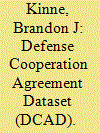

|
|
|
|
|
| Summary/Abstract |
The academic study of defense cooperation focuses heavily on formal military alliances. Yet, governments rarely sign new alliances, and the global alliance structure has remained relatively static for decades. By contrast, governments are increasingly active in defense cooperation agreements (DCAs). These bilateral framework treaties institutionalize their signatories’ day-to-day defense relations, facilitating such wide-ranging activities as defense policy coordination, joint research and development, weapons production and arms trade, joint military exercises, training and exchange programs, peacekeeping, and information exchange. Nearly 2,000 DCAs have been signed since 1980. Preliminary evidence suggests that DCAs impact numerous security, military, and defense outcomes and that governments increasingly incorporate DCAs as core elements of their security strategies. This article introduces the new DCA Dataset (DCAD). I provide a brief historical background on DCAs and compare them to other commonly studied forms of defense cooperation. I then explain coding standards and describe the data set in detail. Finally, I illustrate applications of DCAD to militarized interstate disputes and arms trade.
|
|
|
|
|
|
|
|
|
|
|
|
|
|
|
|
| 18 |
ID:
183145
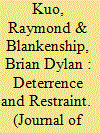

|
|
|
|
|
| Summary/Abstract |
Multinational military exercises are among the most notable demonstrations of military cooperation and intent. On average, one is initiated every 8.9 days. But it has often been argued that joint military exercises (JMEs) increase the risk of war. Using a relational contracting approach, we claim that formal military alliances mediate the effect of JMEs. Exercises and alliances serve complementary functions: The former allows targeted responses to military provocations by adversaries, while the latter provides institutional constraints on partners and establishes a partnership’s overall strategic limitations. In combination, alliances dampen the conflict escalation effects of exercises, deterring adversaries while simultaneously restraining partners. We test this theory using a two-stage model on directed dyadic data of JMEs from 1973 through 2003. We find that JMEs in general do not escalate conflict, and that JMEs conducted with allies in particular reduce the probability of conflict escalation.
|
|
|
|
|
|
|
|
|
|
|
|
|
|
|
|
| 19 |
ID:
072704
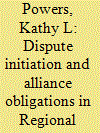

|
|
|
|
|
| Publication |
2006.
|
| Summary/Abstract |
States increasingly incorporate alliance obligations into the design of multilateral trade agreements to deter aggression. Regional economic institutions (REIs) are such an example. This policy activity raises the question of whether REI military alliance obligations send signals and function as institutional constraints that deter aggression. Hypotheses regarding the influence of (1) shared REI military alliance obligations on dispute initiation and (2) REI military alliance obligations on whether a potential challenger will initiate a militarized dispute against a potential target are tested. African REIs, states, and their dispute initiations from 1950 to 2000 compose the sample. Logit analysis of time-series, cross-section data is the method employed. African REI military alliances are an example of African international relations' exceptionalism and innovation in institutional design. Findings suggest African REI military alliance obligations reduce the propensity for aggression between member-states and reduce the likelihood that a potential challenger will attack a potential target and a potential target will be the object of attack. The evidence in this article indicates that such commitments reduce dispute initiation among African states.
|
|
|
|
|
|
|
|
|
|
|
|
|
|
|
|
| 20 |
ID:
133837
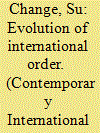

|
|
|
|
|
| Publication |
2014.
|
| Summary/Abstract |
Current international order results from accumulation of different kinds of order in history. They were interconnected regional orders of integrated civilizations centered on a core country.
|
|
|
|
|
|
|
|
|
|
|
|
|
|
|
|
|
|
|
|
|